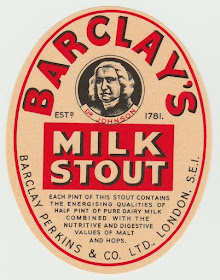They son't seem to have been entirely sure what Milk Stout was, other than that they liked it.
"LOCAL WITNESSES.It seems that Milk Stout drinkers, though they were aware some milk product was in their favourite drink, weren't excatly sure what it was.
Mr. John Lawrence, 6. Victoria-terrace. Seabrook, Hythe, stated that he was a member of a Bowling Club.
Mr. Colefax: Are you acquainted with milk stout? — Yes.
Have you taken it for time? — About two years.
Do you know whether it has a sale in the Bowls Club at Hythe? - Yes it has.
Have you heard it ordered there? —Yes.
What do they ask for? — Milk stout.
What you understand by milk stout? - Some understand that it stout brewed from carbohydrate of sugar - sugar of milk.
Mr. Kirby: That is what you understand from the advertisements? — Yes.
Do you have a very distinct idea of what a carbohydrate is? — No, I haven’t.
I thought not. Do you know how much of the carbohydrate of sugar there must be in it? — No.
Mr. William Henry Banghnm, master printer, of 6. Victoria-road, Folkestone, said he was acquainted with milk stout, and had drunk it.
Mr. Colefax: What you undestand by it? — I understand that there is an extract of milk in it and that, therefore, it is different from other stout.
You have drunk it and found different from ordinary stout? — Yes, different altogether.
When have you taken it?— In the house, and I also have it when out in the evenings.
You can get it in the holels, and so forth? -Yes.
What do you ask for? — A bottle of milk stout.
Mr. Kirby : Mackeson's are Hythe brewers, are they not, and have a very good trade in Folkestone and around, and make a point of pushing their milk stout in the district?— I believe so."
Folkestone, Hythe, Sandgate & Cheriton Herald - Saturday 23 December 1911, page 5.
"OTHER EVIDENCE.
Mr. Hugh Spencer Charrington, one the Directors of Charrington and Co., Ltd., brewers, Burton-on-Trent, said that they had been brewing milk stout since August, being the holders of sub-license. The stout contained nine pounds of lactose in each thirty-six gallon barrel. He believed the present market price of lactose was about £80 per ton.
Mr. O'Donnell Grimshaw, Manager and of the Lion Brewery, Lambeth, gave similar evidence with respect to the quantity of lactose put in the milk stout, which his Company had brewed since June July of last year. The Company had spent about £2,000 in advertising it.
Mr. Kirby: You have been careful explain on all your labels and advertisements exactly what milk element your stout contains? — Yes.
Have you been advised that you could not legally call it milk stout without qualifying words? — I don’t think I have been advised that.
Do you think it would be honest to describe your compound milk stout without qualifying the words? — No, it does not contain milk pure and simple.
Mr. Phillip Winterton, Secretary of Ansell Brewery, Aston, Birmingham, and Mr Maurice Stratton, Assistant Manager of the Aston Gate Brewery, Ltd.. Bristol, also gave evidence as to brewing milk stout.
Mr. A. C. Chapman, consulting and analytical chemist, stated that he had been unable to trace evidence of lactose in defendant’s milk stout. His analysis would disclose lactose in stout if it were not in less proportion than half a pound to thirty-six gallons. He was not prepared to swear that no milk powder had been put into the stout.
Mr. Henry Richmond, an analyst, gave similiar evidence, stating that lactose was not present in the defendant's stout in any appreciable quantity.
This concluded the case for the comnplainant.
Mr. Kerby submitted at length that there was no case for him to answer.
The magistrate decided to the contrary, however, and at the next hearing — which is fixed for January 13th - evidence will be called for the defence."
Folkestone, Hythe, Sandgate & Cheriton Herald - Saturday 23 December 1911, page 5.
Now isn't that dead handy? Mr. Charrington has told us how much lactose was in their Milk Stout: 9 lbs per barrel. That works out to arouns 1.25 lbs for a home brew recipe of 5 imperial gallons. looking through my Milk Stout recipes I see that 1943 Whitbread-brewed Mackjeson contained 1 lb, and the 1973 version 0.75 lbs. So rather less than Charrington recommended. While 1933 Barclay Perkins Milk Stout contianed 1.75 lbs.
Though in the case of Mackeon, the smaller amount of lactose might just be the result of a reduced gravity. What's really important is the percentage of lactose in the grist, not the absolute weight of lactose used.
Wonder where this court case is going? So do I.

Ending on a cliff hanger!
ReplyDelete